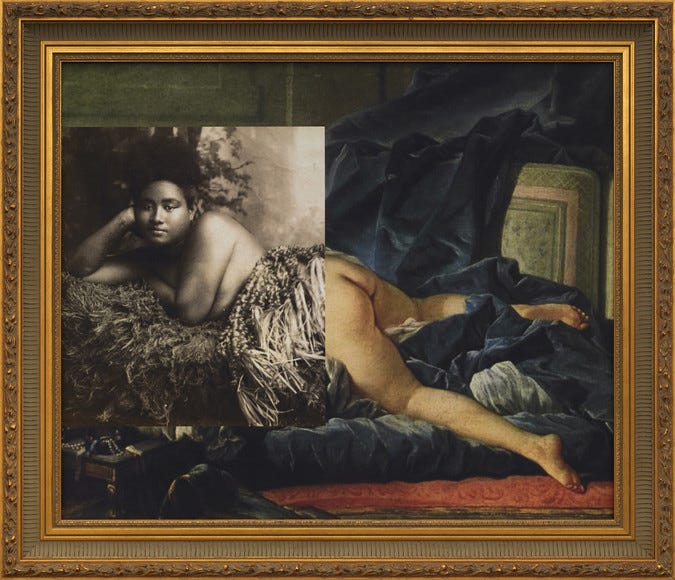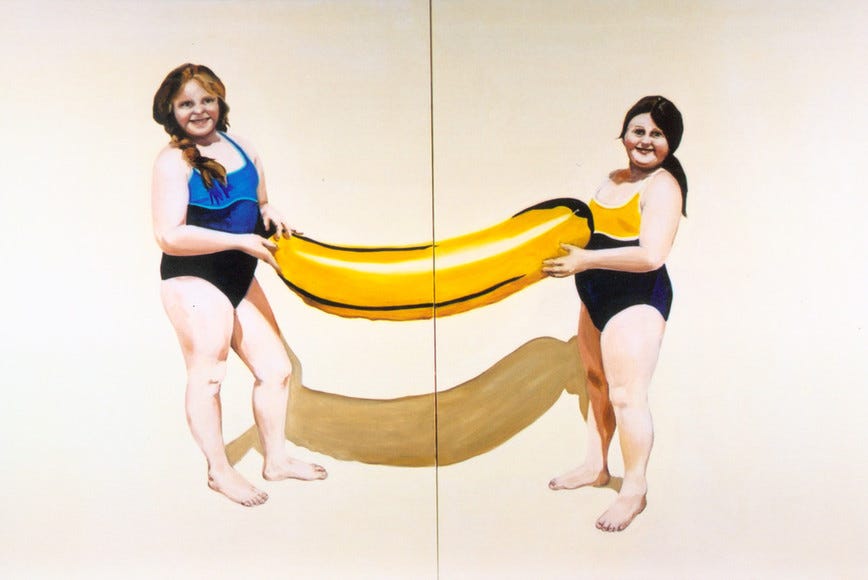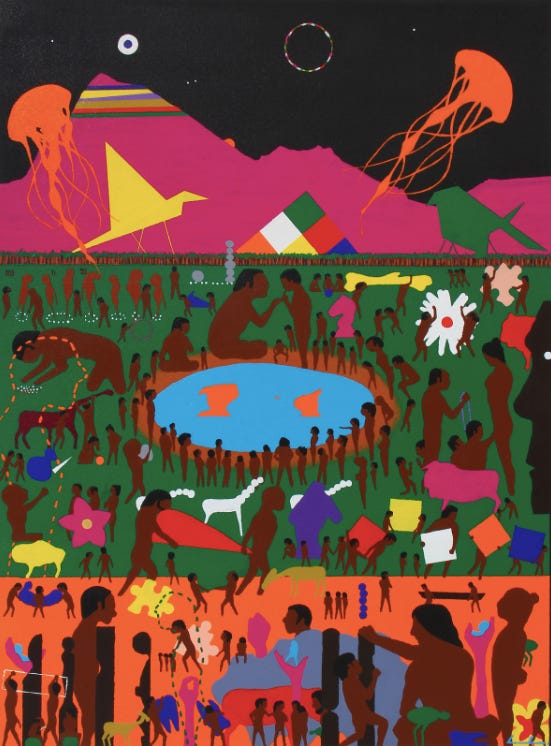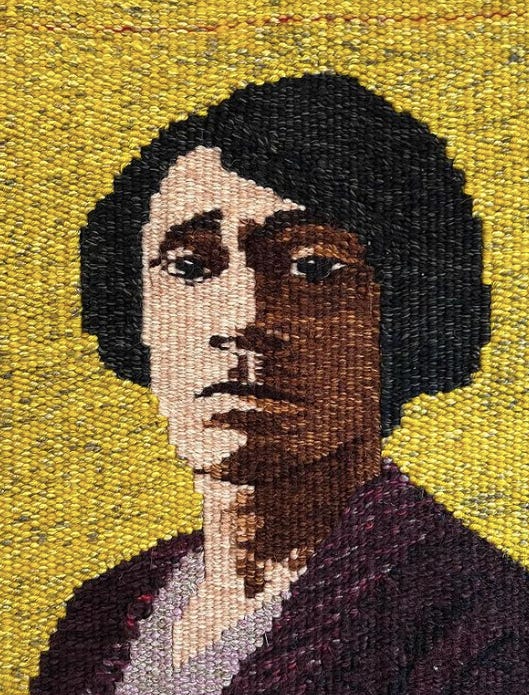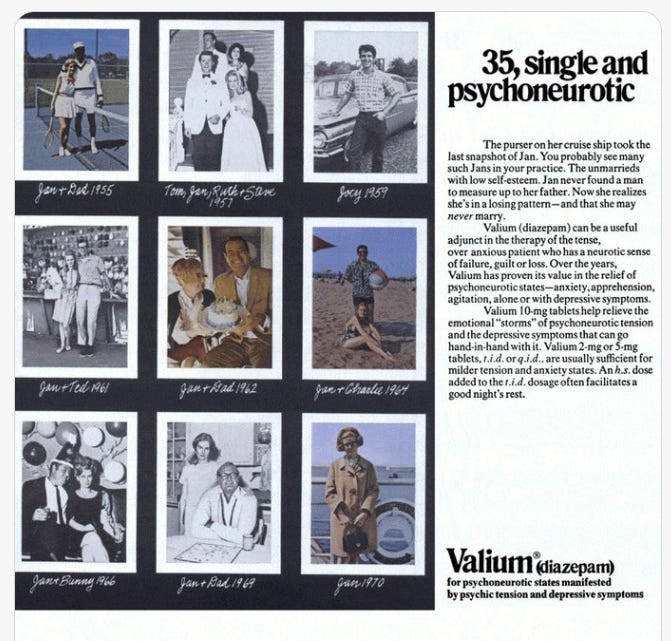No. 34
The shadow self; Meatfluencers; pet culture; 'Myths of Merit and Deservingness'; Anna Nicole Smith; contaminated bodies; mass hysteria; 'Takeout Kids'
Hi everyone,
Long time, no newsletter. But it’s back!
Hope you enjoy the links, art etc. (Did you know Gen Z says ‘let’s link’ for ‘let’s meet up’ or ‘we should do something’? My Gen Z daughter gives me this useful info. Love it, love the youth. Let’s link!)
Remember to LIKE SHARE AND SUBSCRIBE ! ! and I’ll see you next time,
~Ellie
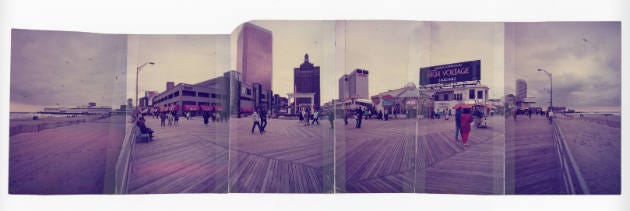
‘Rib-eye steak “is viscerally and primitively satisfying to me”, [says] Dr. Shawn Baker.’ On ‘Meatfluencers.’
Just a little bit of satire re. our govt. of drongos (my MIL says ‘drongo’ - it’s a good insult): ‘Our organisation is greatly concerned with your plans to make crime illegal. I was first made aware of this announcement when you tagged us on TikTok “@criminals”. In future, I would suggest that Discord or Signal would be a better way to get in touch with us.’
An opportunity for a dive into ‘pet culture’ presented itself, and who was I to say no: Nepo dogs; Dolce and Gabbana’s new ‘Delicate, authentic, charismatic’ scented mist for dogs; a New York Magazine ‘Pet Ethics’ special, featuring thoughts on whether your cat’s a prisoner, what vets really think about emotional support animals, how awful it is to be a pug, ‘the final word on fish’, and more. Get involved!
‘Janelle Stone’s estate sales have a way of inspiring a frenzy. She used to post the address of an upcoming sale online a few days in advance, but things occasionally got out of hand. People camped out for four days to be first in line, or peered in the window as she attached price tags to fur coats and Hermès scarves. Once, a woman tried to crawl down a chimney to get early access.’ On ‘The Estate Sale Queen of Dallas.’
‘A psychoanalytic take on Donald Trump’s approach to menswear.’
An excellent piece by bright spark Dorian Lynskey on the general state of criticism: ‘The dying art of the hatchet job. […] I worry that enthusiasm is being mistaken for a moral virtue, and negative criticism for a character flaw: What’s wrong with you? Why can’t you just like things?’
A piece from The Hedgehog Review (cute!) on whether we should be so attached to thinking that travel is fundamentally ‘good for people’: ‘What Has Travel Ever Done for Me?’
‘Auto Show Dispatch.’ One of those excellent articles that seems to be about one thing (in this case cars/car shows) but is actually just an inroad into talking about lots of different things (in this case Reagan-era xenophobia re. Japanese imports, the climate crisis, changes in culture and work, inequality). Which possibly sounds a bit bleak, and it can be, but it’s mainly fascinating and illuminating. Recommend!
A neo-pagan sect in Nothern England: ‘Luckily for the perpetually skint, paganism is cheap as far as religious conversions go. It requires no setup costs. “You can just do it”, Victoria tells me.’
A nice little intro to the work of Joan Semmel, ‘a pioneer of the female gaze’, here.
I don’t know how they do it, but the editors at The Atavist have quite the knack for finding a compellingly dark and sordid story - and I find sometimes you’re in the mood for that kind of thing, and sometimes not. In case you’re in the mood, here’s ‘Watch it Burn: Two scammers, a web of betrayal, and Europe’s fraud of the century’.
‘How GoFundMe Perpetuates Myths of Merit and Deservingness: Crowdfunding distracts us from the fundamental idea that everyone, regardless of "merit," is worthy of care and assistance when they need it.’ Yes!
Thoughts: a hundred points to this writer for exploring ideas on suffering and relief from suffering - who ‘deserves’ relief, and who ‘doesn’t’. It’s an area of life that seems filled with moral absolutism, judgement and strange unconscious drives. GoFundMe et al certainly provides a way to give individuals a feeling of benevolent power, although probably all acts of charity are essentially about that; whether you end up giving or not, it all seems somehow morally dubious. Note: I am not against giving to charity! Oh no! Definitely not! It’s just very complex.
And: ‘The Man Who Couldn’t Stop Giving.’ On generosity and ‘the biological roots of philanthropy.’
‘Back in 2021, a 22-year-old from Arkansas named Trevor Rainbolt shuttered himself in his Los Angeles apartment to memorize the world. For months, he spent his time studying Google Street View from his desk chair. Delivery drivers handed over his meals; a barber came to style his hair. After a while, his memory grew planetary. When you see cabbage-like plants thriving along the sides of a Russian country road, he learned, you’re most likely looking at Sakhalin Island. On a bridge lined with pea-green pavement? You’re above a river in Indonesia’s Central Kalimantan province. If your vista, but for the sweep of golden grasslands, screams South Africa, you’ll be in Eswatini.’
Sexxxy ! ! ‘To promote marriage and address the chronically low birthrate, the Tokyo metropolitan government is releasing its own dating app with an emphasis on strictness to prevent problems associated with other match-making services.’
“I am pleasing to everyone”: on the Dallas Cowboys Cheerleaders. 😓 And it seemed right to put this little piece on Anna Nicole Smith here too: ‘Like my body? She doesn’t need to ask. Still, she’ll indulge us. After all, indulgence is what we accused her of: immoderation, intemperance, an appetite for eyes and sighs.’
Bleak reading ahead warning ! ! On plastics/chemicals, corporate cover-ups, and our unwittingly contaminated bodies: ‘Writing in the 1950s, as mass-produced plastic was coming to define material culture in the West, the French philosopher Roland Barthes saw the advent of this “magical” stuff effecting a shift in our relationship to nature. “The hierarchy of substances,” he wrote, “is abolished: a single one replaces them all: the whole world can be plasticized, and even life itself since, we are told, they are beginning to make plastic aortas”: Our Way of Life Is Poisoning Us.’ And from The New Yorker and ProPublica: ‘How 3M Discovered, Then Concealed, the Dangers of Forever Chemicals.’
On the shadow self: ‘In Jung's disposition, he believed the shadow aspect of our self as “a thing a person has no wish to be". He also described it as the part of our psyche containing the hidden aspects of our personality that we reject or hide from others, even ourselves.’ How freeing and kind to the people around us to acknowledge our worst parts e.g. I’m capable of deep, often petty, envy; I’m vain; I long to be praised. (Just, um, as examples.) I just think it’s very healthy, and especially necessary if you’re a parent - nothing more damaging to a child than a parent who has an unacknowledged unconscious running the show. Own that shadow! 😈
An Antarctic diary from 1898: ‘“It is the fifth day of the long night, and it certainly seems long, very long, since we have felt the heat of the sun.'“‘
Little Priyan, too precious for words. 🥹
‘On Joining and Leaving the Border Patrol: Francisco Cantú offers a poignant firsthand account of life along the U.S.-Mexico border. […]When I look back on that time, I had this idea as a young person in my early 20s that I could be part of this system. I could step into this system and not partake in the uglier aspects that I knew about and was familiar with. I imagined that I could see and learn, but not be implicated. I imagined that I could be a force for good within this agency that I already didn’t agree with, but I sort of accepted as inevitable. I accepted it as this inevitable part of shaping the reality of the border.’
Two very different, but both excellent pieces from The Fence: ‘I am generally against personal essays. I think they are undignified. Which is unfortunate for me, because when you get divorced, as I have just done, all anyone wants to know is what happened. I am not that young—but I am young to be divorced. My advice for anyone who feels self-conscious about their age would simply be: don’t get botox, get divorced.’ And ‘An anonymous probation officer tells us about their working life.’ High recommend on both.
‘Alex Casey takes a stroll through headlines detailing hundreds of beached kiwifruit, dozens of mailbox sausages and one giant mystery ham.’
Both from Huck mag: ‘Behind the scenes of the UK’s village hall wrestling community.’ And peak England: ‘Each year in the Cotswolds, hundreds of competitors sprint down a sheer, uneven cliff to chase after a wheel of Double Gloucester cheese, risking injury and even consciousness. This year we sent photographer Theo McInnes to capture the action’.
‘Working as a bookseller kind of reminds me of bartending: people from all walks of life come through the bookstore asking for titles ranging from British colonialism to weed recipes to Dolly Parton outfits.’
Hah! The take-down that needed to happen! Good words from Hera Lindsay Bird on that weird, empty kids’ book series ‘Little People, Big Dreams’: ‘Children’s picture books should be about what happens when a witch turns you into a pig. Or a sausage with bad intentions who lives down the back of the stove. Or a mouse who is also an architect. They should not be about Elton John or Kamala Harris.’ See below.
‘World-building: the importance of children’s literature. “Originality is not and never has been the vital ingredient in children’s literature,” writes Sam Leith in The Haunted Wood, in response to critics who have sniffily dismissed JK Rowling’s Harry Potter novels as derivative. In this magisterial and wonderfully entertaining overview of the history of (mainly British) children’s literature, he demonstrates how deep and primal are the fears and longings it expresses. Although their forms differ by era, all children’s tales—which are really tales for everyone—have a common goal, which is to reveal the deep, joyous, mysterious realities of the world.’
Murdoch Stevens, founder of Lawrence and Gibson publishing, writes about actually, literally, making a book - glue, paper, spine - and how we tend not to think about the physical aspect of the book, beyond possibly admiring its cover: ‘If we are going to worship the book as an object, then let us worship it as it really is. Let us turn the pages gently, enjoy the bend of a vertical grain as it deserves to and see the book as one object among many where the labour of the writer meets the labour of the printer and publisher.’
Well, the NYT’s Best 100 Books of the 21st Century caused a bit of a stir didn’t it? I mean, depending on what circles you move in. There were SHOCKING omissions, SHOCKING inclusions, and I loved reading how cross people got about it all. Some of the best entertainment of my year so far. Plus, of course, some excellent sounding books to add to the reading pile.
Nina Stibbe, frequently-mentioned writer of both excellent fiction and excellent diaries, lists her five favourite diaries.
If you’re in the market for some interesting political non-fiction, the 2024 Orwell Prize shortlist, and winner, has been announced. (There are also categories for Political Fiction, Journalism, and Reporting Homelessness.) Always a useful way to find some good books/articles, that might otherwise have gone undiscovered, I find.
If you can cope with the very particular in-house style of e.g. This American Life, then you’ll be able to cope with this; if that particular style makes your skin crawl, then probably stay away!
‘Hysterical investigates a mysterious illness that spreads among a group of high school girls in upstate New York. What is causing their sudden, often violent symptoms? Is there something in the water or inside the school? Or is it “all in their head?” The series examines the outbreak in LeRoy, NY, believed by some to be the most severe case of mass hysteria since the Salem Witch Trials. In his search for answers, Dan Taberski explores other seemingly inexplicable events of the last few years – CIA officers being crippled with nausea and vertigo; cops OD'ing from exposure to fentanyl – and discovers they’re far more connected than we realize.’
Three Million: ‘During the Second World War, at least three million Indian people, who were British subjects, died in the Bengal Famine. It was one of the largest losses of civilian life on the Allied side. But there is no memorial to them anywhere in the world - not even a plaque. Can three million people disappear from public memory? From the award-winning creator and presenter of Partition Voices and Three Pounds in My Pocket, this is the story of the Bengal Famine of 1943. For the first time it is told by those who were there - farmers and fishermen, artists and writers, colonial British and everyday citizens. Nearly all of the testimony in the series has never been broadcast before.’

